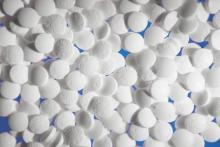Regular aspirin use appears to protect against the development of metastatic and fatal prostate cancer, according to an analysis of the Physicians’ Health Study.
Investigators led by Dr. Christopher Brian Allard analyzed data from 22,071 male physicians who were initially free of prostate cancer and were prospectively followed from 1982 through 2009.
Results showed that after adjustment for age, race, body mass index, and smoking status, men who took aspirin regularly (more than three tablets a week) were 24% less likely to develop lethal prostate cancer, which was defined in the study as metastatic disease or death from prostate cancer, Dr. Allard reported in a press briefing held before the 2016 genitourinary cancers symposium sponsored by the American Society of Clinical Oncology, ASTRO, and the Society of Urologic Oncology.
However, regular aspirin use did not reduce the risk of prostate cancer overall, of high-grade prostate cancer, or of locally advanced prostate cancer.
Further analyses restricted to the men who developed prostate cancer showed that regular aspirin use after diagnosis was associated with a 39% lower risk of dying from the disease. In contrast, use before diagnosis did not have a protective effect.
“Our study demonstrates that regular aspirin intake may inhibit lethal prostate cancer, probably by preventing cancer progression,” said Dr. Allard, a urologic oncology fellow at Brigham and Women’s Hospital and Massachusetts General Hospital, both in Boston. Also, “men with prostate cancer who took aspirin regularly after diagnosis had a significantly reduced risk of death.”
Although aspirin’s exact mechanism in preventing lethal disease is unknown, preclinical data have implicated its antiplatelet action, which is consistent with evidence suggesting that circulating cancer cells may use platelets to escape immune detection, he said. “That would explain why there is no effect on the local cancer, but it is preventing deposition of metastases into metastatic environments.”
The main shortcoming of the research was the lack of information on aspirin dose, Dr. Allard acknowledged. Although the Physicians’ Health Study began as a randomized trial in 1982 testing 325 mg of the drug every other day, it was formally stopped 5 years later after cardiovascular benefit was established, and participants were free to take any dose thereafter. “We think most men started at 325 [mg] but then 81 mg did become a popular dose, and we really don’t know what they were taking,” he said.
“More work is needed to identify particular subsets of men most likely to benefit from aspirin and to determine the optimal aspirin dose,” Dr. Allard said.
In terms of applying the findings to clinical care, he recommended an individualized approach. “The main thing to keep in mind is that although aspirin is over the counter, there are side effects and potential harms. That being said, we don’t have the results of a randomized clinical trial looking at aspirin for prostate cancer survival yet,” he said. So men who are interested in aspirin for prevention of lethal prostate cancer should talk to their physicians, he added, “and look at their personal risks of side effects and harms from aspirin, as well as their benefits in terms of both prostate cancer and also potential cardiovascular benefits. It needs to be a personalized decision for every individual patient.”
Dr. Sumanta Pal, ASCO spokesperson and moderator of the press briefing, agreed that the trial left unanswered some critical questions and that clinicians must weigh the potential harms of aspirin therapy against the observed benefits.
“While this work is provocative, it’s important to keep in mind that the findings were from an observational study in which surveys and a review of hospital records were used to obtain information,” added Dr. Pal, a medical oncologist at City of Hope in Duarte, Calif. “These studies are certainly thought provoking but are perhaps best followed by formal clinical trials where we compare use of aspirin either to no treatment or perhaps to placebo.”
Dr. Allard disclosed that he had no conflicts of interests. The Prostate Cancer Foundation and the National Institutes of Health/National Cancer Institute funded the trial. Dr. Pal disclosed that he receives honoraria from Astellas Pharma, Medivation, and Novartis; that he has a consulting or advisory role with Aveo, Genentech, Myriad Pharmaceuticals, Novartis, and Pfizer; and that he receives research funding from Medivation.
*This article was updated 1/6/2015.


